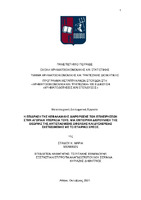Η επίδραση της κεφαλαιακής διάρθρωσης των επιχειρήσεων στην αγοραία υπεράξια τους. Μια εμπειρική διερεύνηση της θεωρίας της αντιστάθμισης ωφέλειας και δυσχέρειας σχετιζόμενης με το εταιρικό χρέος

View/
Keywords
Κεφαλαιακή διάρθρωση ; Trade off theory ; Pecking order theory ; Market timing theory ; Φοροαπαλλαγή ; Χρηματοδότηση ; Μόχλευση ; Δανεισμός ; Κέρδη ; ΤόκοιAbstract
The purpose of the present study is to theoretically investigate the capital structure and the most important theories that surround it, as well as to give a brief image of the selected countries' finances. Nowadays, technological progress is arriving at companies worldwide at a quick pace with the aim of improving their positions in the market, as far as their efficiency and competitiveness are concerned. In order for companies to gain a competitive advantage, they invest great sums of money in research and development expenditures (E&A), so as to develop innovations. Subsequently, companies with the objective to manage the technical requirements of the new generation need to invest more and more in software programs. For this purpose we examined a sample composed of four large countries at a global level, which were selected by specific criteria, more specifically they are titans in the world of Software Development. To be more specific, for the effectiveness of the sample the selected countries were classified by year, by company and by country. The objective of the research is to examine how much the capital structure of the company affects its surplus value, as well as if the benefits and difficulties related to the company's debt are counterbalanced. One of the most basic hypotheses we made for the selected department's research is that due to the nature of the subject, there are a lot of fixed intangible elements, that is why we believe that especially during the years of the crisis (2008 onwards), apprehensive about bankruptcy, they present few bank loans, hence they don't fully take advantage of the tax exemption of the interest. The results indicate that the department's companies are borrowing conservatively and it is considered beneficial for them to increase their borrowing, as a means of increasing their market value.


